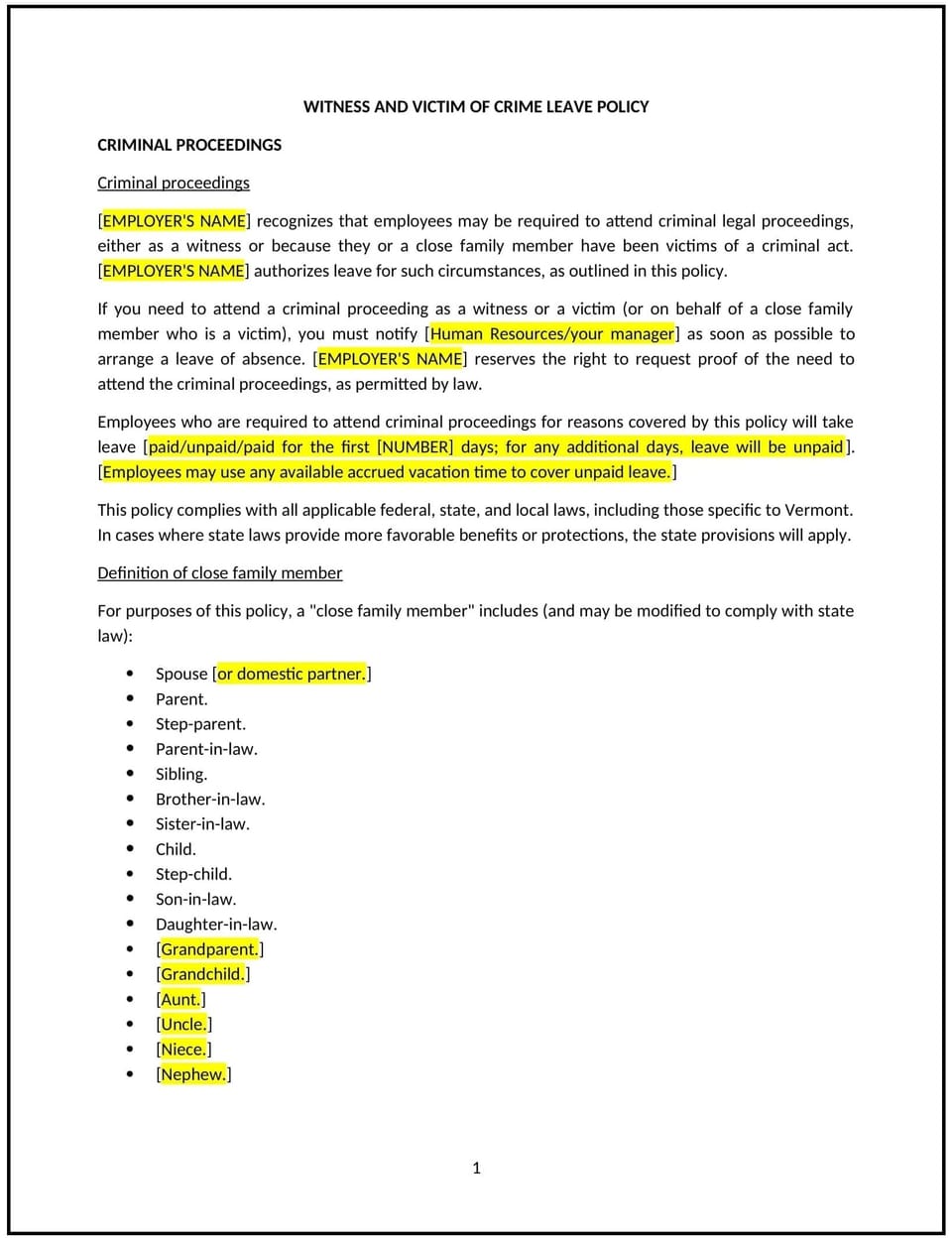Witness and victim of crime leave policy (Vermont): Free template

Witness and victim of crime leave policy (Vermont)
This witness and victim of crime leave policy is designed to help Vermont businesses support employees involved in legal proceedings or recovering from criminal incidents. It provides guidelines for requesting leave, maintaining confidentiality, and complying with Vermont laws to ensure employees are treated with fairness and respect.
By adopting this policy, businesses can promote employee well-being, support civic duties, and maintain compliance with Vermont labor regulations.
How to use this witness and victim of crime leave policy (Vermont)
- Define eligibility: Specify the circumstances under which employees are eligible for leave, such as being subpoenaed as a witness or seeking time off to recover from a crime.
- Include leave request procedures: Outline how employees can request leave, including advance notice requirements and any necessary documentation, such as a subpoena or police report.
- Address paid and unpaid leave: Clarify whether leave is paid or unpaid, and provide details on any wage replacement options or benefits available.
- Emphasize non-retaliation: Ensure employees are protected from retaliation or adverse consequences for taking leave under this policy.
- Provide support resources: Offer access to employee assistance programs (EAPs), counseling services, or legal resources to help employees navigate their situation.
- Maintain confidentiality: Reinforce the importance of protecting employee privacy and handling leave requests discreetly.
- Monitor compliance: Regularly review leave practices to ensure alignment with Vermont laws and workplace standards.
Benefits of using this witness and victim of crime leave policy (Vermont)
This policy provides several benefits for Vermont businesses:
- Supports compliance: Aligns with Vermont labor laws regarding leave for witnesses and crime victims.
- Promotes well-being: Demonstrates the company’s commitment to supporting employees during difficult times.
- Reduces legal risks: Ensures adherence to laws protecting employees involved in legal proceedings or recovering from crimes.
- Enhances morale: Shows that the company values employees’ rights and supports their needs.
- Improves transparency: Provides clear guidelines for managing leave requests related to legal or criminal matters.
Tips for using this witness and victim of crime leave policy (Vermont)
- Communicate the policy: Share the policy with employees during onboarding and include it in the employee handbook or internal resources.
- Train managers: Educate managers on Vermont laws and how to handle leave requests fairly and compassionately.
- Foster a reporting culture: Encourage employees to communicate their needs without fear of retaliation or judgment.
- Track leave usage: Maintain accurate records of leave requests and approvals to ensure consistency and compliance.
- Update regularly: Revise the policy to reflect changes in Vermont laws, workplace practices, or employee needs.
Q: What situations qualify for leave under this policy?
A: Leave is available for employees subpoenaed as witnesses, victims recovering from crimes, or those needing time off to attend legal proceedings related to a crime.
Q: Is this leave paid or unpaid?
A: Leave may be paid or unpaid, depending on company policy and Vermont laws. Businesses should specify any wage replacement benefits available.
Q: How should employees request leave under this policy?
A: Employees should submit a formal leave request to their manager or HR, including any required documentation, such as a subpoena or police report.
Q: How can businesses ensure confidentiality?
A: Businesses should limit access to information about leave requests to authorized personnel and handle all documentation securely.
Q: What resources can businesses offer to affected employees?
A: Resources may include employee assistance programs (EAPs), counseling, legal support, or additional workplace accommodations.
Q: How often should this policy be reviewed?
A: This policy should be reviewed annually or whenever significant changes occur in Vermont laws or workplace practices.
Q: Are part-time employees eligible for leave under this policy?
A: Businesses should specify eligibility for part-time employees, typically aligning with Vermont laws governing leave entitlements.
Q: How can businesses handle extended leave requests?
A: Extended leave requests should be evaluated on a case-by-case basis, supporting compliance with Vermont laws and balancing operational needs.
This article contains general legal information and does not contain legal advice. Cobrief is not a law firm or a substitute for an attorney or law firm. The law is complex and changes often. For legal advice, please ask a lawyer.


